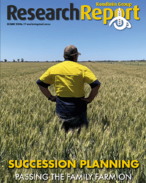This article is 7 years old. Images might not display.
This revolutionary scanning technology developed by Murdoch University and their research partners is offering considerable efficiency savings. So much so, Meat & Livestock Australia (MLA) has announced plans to install the technology at meat processing facilities for free throughout Australia.
New work done at a Victorian abattoir has demonstrated positive results with cattle, following successful trials in lamb.
Murdoch University’s Associate Professor Graham Gardner, who developed DEXA in collaboration with Scott Automation & Robotics, said cattle are sold mainly based on their weight.
“This method is a poor indicator of the amount of meat on a carcase. Our analysis of this traditional method, using beef datasets, found that accuracy varied from 10-80%,” Gardner said.
“Results from the latest commercial trials shows that DEXA can accurately measure beef and differentiate meat from fat and bone with good precision,” he said.
“DEXA described 88% of the variation in carcase fatness within the mob of 50 cattle scanned, with the bulk of these predictions ranging within three carcase fat % units of their true value.”
In May last year, the MLA announced that Murdoch University would lead a $12.5m project to develop DEXA and other carcase measurement technologies.
The Advanced Livestock Measurement Technologies project is funded by the government’s Rural R&D for Profit program. It is focused on further refinement of the lamb and beef DEXA algorithm, the development of eating quality and live animal measures, industry database alignment and the promotion of processor-producer feedback.
MLA announced this week a further $10 million investment to accelerate the adoption of the DEXA technology.
The organisation is partnering with meat processing plants around the country to support the installation of DEXA measurement systems.
MLA Managing Director Richard Norton said this project will enable supply chains and the businesses within them to drive new efficiencies, generate more value and better meet market demands, which ultimately improves our industry’s international competitiveness.
Professor Gardner said he was delighted that the DEXA scanning technology has now been selected by the Australian meat industry as the key to future efficiency savings.
“Once the system has been fully implemented, Australia will set the standards which the international industry will follow,” Gardner said.
The rollout of DEXA technology will not only bring greater accuracy in terms of meat yield and improved profit margins, it will also provide vital data which will help raise meat quality and consistency across the industry.






















